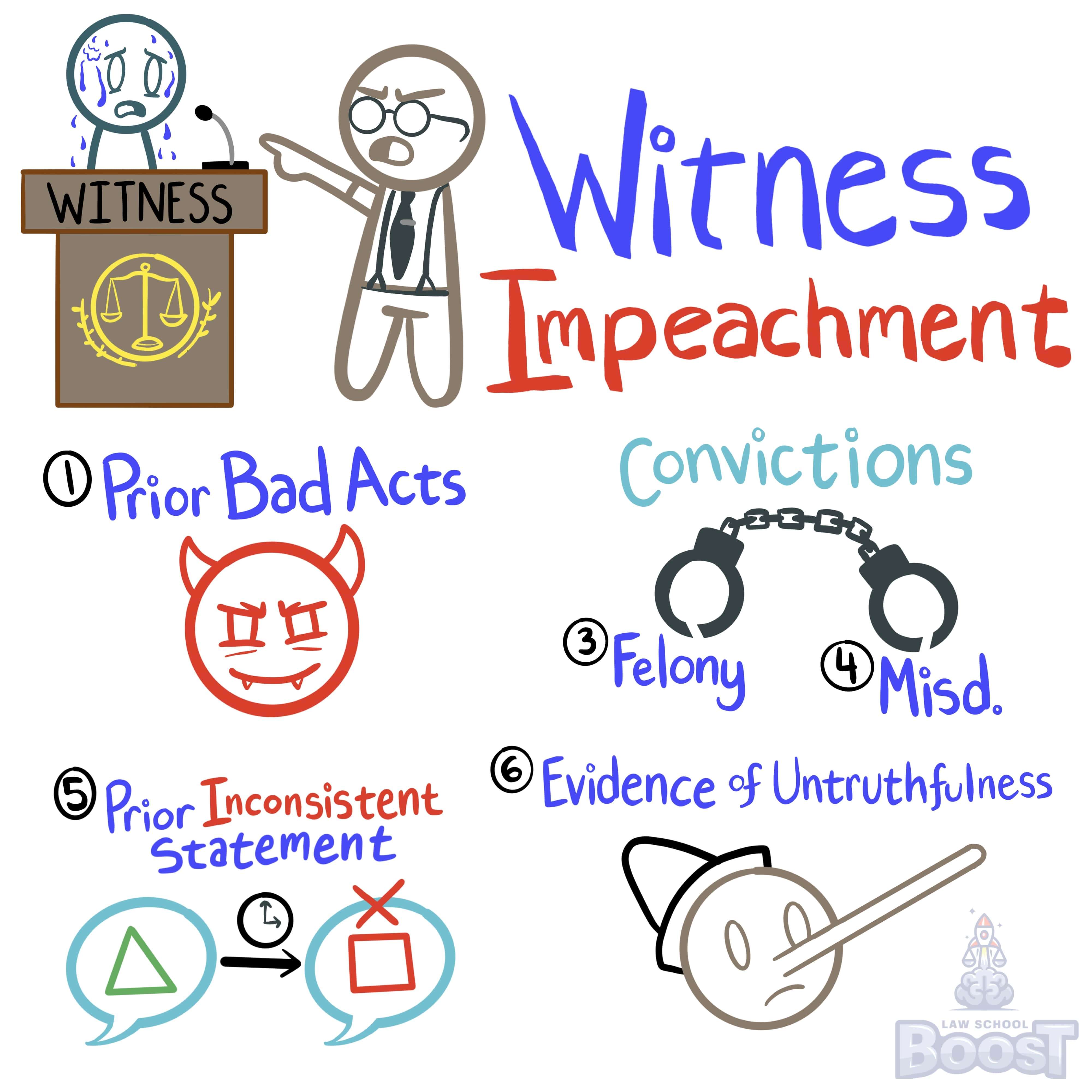🦅
Federal Evidence • Witness Impeachment
EVID#092
Legal Definition
A witness may be impeached by felony convictions that involve dishonesty or false statements, and the court has no discretion to engage in a Rule 403 balancing unless the conviction is more than 10 years old.
Other types of felony convictions are admissible, but are subject to the court's discretion under Rule 403.
Note that if a criminal defendant is the one attempting to be impeached, their conviction is inadmissible unless its probative value outweighs unfair prejudice (which is much more strict than Rule 403).
Other types of felony convictions are admissible, but are subject to the court's discretion under Rule 403.
Note that if a criminal defendant is the one attempting to be impeached, their conviction is inadmissible unless its probative value outweighs unfair prejudice (which is much more strict than Rule 403).
Plain English Explanation
Courts can use evidence of a person's past felony convictions involving lies or dishonesty to question their truthfulness as a witness (like fraud). There's no option for the court to weigh the importance of this evidence against its potential to cause bias, except if the conviction happened over 10 years ago. Other types of felony convictions can be used too, but the court has to decide if their importance outweighs the risk of causing unfair bias. However, if the person being questioned is the one on trial, their past conviction can only be used if it's really important for the case and doesn't cause too much bias.
Hypothetical
Hypo 1: Bob, a well-known businessman, is called as a witness in a trial. He has a past felony conviction for embezzlement. Sam, the attorney, wants to use this conviction to question Bob's credibility. Result: The court allows Sam to use Bob's past conviction as it directly relates to dishonesty, thus casting doubt on Bob's trustworthiness as a witness.
Hypo 2: In another case, Bob is on trial for a recent crime. He has a prior felony conviction for a non-violent theft from 15 years ago. Sam, representing the prosecution, wants to use this old conviction to impeach Bob. Result: The court decides not to allow this past conviction as evidence due to its age, applying the rule that convictions over 10 years old require careful consideration to avoid prejudice.
Hypo 3: Bob testifies in a small claims court about a contract dispute. He has a recent felony conviction for tax evasion. Sam, the opposing lawyer, brings up this conviction to question Bob's honesty. Result: The court allows the use of this conviction under the rule, as it involves dishonesty and is relevant to Bob's credibility.
Hypo 4: In a lawsuit, Bob is a key witness. He has a prior felony for drug possession. Sam, questioning Bob's reliability, wants to introduce this conviction. Result: The court must use Rule 403 to decide whether the probative value of this evidence outweighs its potential for unfair prejudice, as the conviction does not involve dishonesty or false statements.
Hypo 2: In another case, Bob is on trial for a recent crime. He has a prior felony conviction for a non-violent theft from 15 years ago. Sam, representing the prosecution, wants to use this old conviction to impeach Bob. Result: The court decides not to allow this past conviction as evidence due to its age, applying the rule that convictions over 10 years old require careful consideration to avoid prejudice.
Hypo 3: Bob testifies in a small claims court about a contract dispute. He has a recent felony conviction for tax evasion. Sam, the opposing lawyer, brings up this conviction to question Bob's honesty. Result: The court allows the use of this conviction under the rule, as it involves dishonesty and is relevant to Bob's credibility.
Hypo 4: In a lawsuit, Bob is a key witness. He has a prior felony for drug possession. Sam, questioning Bob's reliability, wants to introduce this conviction. Result: The court must use Rule 403 to decide whether the probative value of this evidence outweighs its potential for unfair prejudice, as the conviction does not involve dishonesty or false statements.
Visual Aids

Related Concepts
How may a witness be <impeached>?
In California, how may a witness be impeached?
When attempting to impeach a witness, how do courts handle the admissibility of evidence related to evidence of character for untruthfulness?
When attempting to impeach a witness, how do courts handle the admissibility of evidence related to misdemeanor convictions?
When attempting to impeach a witness, how do courts handle the admissibility of evidence related to prior inconsistent statements?
When attempting to impeach a witness, how do courts handle the admissibility of evidence related to specific instances of conduct and prior bad acts?
When attempting to impeach a witness in California, how do courts handle the admissibility of evidence related to felony convictions?
When attempting to impeach a witness in California, how do courts handle the admissibility of evidence related to misdemeanor convictions?
When attempting to impeach a witness in California, how do courts handle the admissibility of evidence related to prior inconsistent statements?
When attempting to impeach a witness in California, how do courts handle the admissibility of evidence related to specific instances of conduct and prior bad acts?
When attempting to impeach a witness in California, how do courts handle the admissibility of evidence under Proposition 8?


